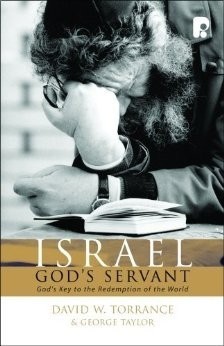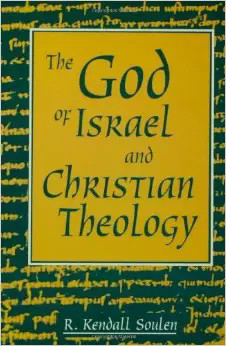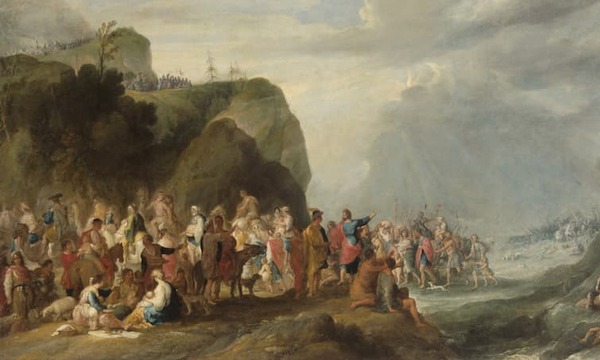This weekâs conference, âIsrael and the Church: A Troubled Past and Glorious Future,â hosted by Biola and Chosen People Ministries, provided yet another opportunity for me to think âbig picture.â As most of us, I suppose, the cares of daily tasksâemails, news cycles, family, work-ministry, church-ministryâI can get so buried in the daily that I lose the plan! By plan I mean the narrative that God has written for the world. A narrative that first rescues a fallen creation and then restores it to the flourishing fullness God made it for.
The conference addressed the Bibleâs picture of a restored nation of Israel in that narrative and also how some have redrawn that picture beginning even very early in the Churchâs history. Now the future of a restored nation of Israelâpeople and landâis complex in Scripture, so itâs understandable there may be differing views on it, but one issue remains intransigent to any attempt of finding the fulfillment in the Church of the promises and calling of national Israel. It is the issue of theocracy.
Theocracy, of course, is âgovernment by godâ and typically comes by way of a godâs appointed human mediators. Itâs a religious State. In Scripture theocracy not only applies to Israel, the chosen nation of the Living God; it applies to all nations. Thatâs because of the theological worldview of the Bible nations are defined by common ethnicity, language, territory and theology. [1] What this last element means is that nations are an immediate link to a patron âgodâ (and, by the way, letâs not think super modern America is exempt from this picture, either!). Beyond this link, Scripture says that the gods of the nations are âidolsâ and that such âgodsâ are actually demonic spirits. Check out Deuteronomy 32:16-17, Jeremiah 16:19 and a host of other passages for these connections.
Theocracy when Israel is born
The theological worldview of the Bible is where the answer to our questionâDoes the world need a theocracy? â must begin. When Israel appeared according to the promise God made to Abraham (Gen. 12:2; cf. Exod. 6:3-5), for the first time the Living God had his nation on the stage of history. Other nations sponsored by their âgodsâ of course where already on the scene â since Babel (Gen. 11) according to some Jewish traditions. Such is certainly true with Egypt and its gods, which is why Israelâs deliverance is more than simply a display of Godâs mighty acts. Really what we are looking at is a spirit-world cage match! And if Egyptâs Re (sun god), Serapis (healing god), Hapi (frog/Nile god), Uatchit (fly god), etc., are any witness, never get into the Octagon with the Living God!
 But whatâs the point of this power encounter? In Exodus 7:5, God himself says itâs âso that the Egyptians will know that I am the Lord.â And here is the first reason for theocracyâit is to manifest the glory of the Living God before the object of his concern ⊠the people of the nations. This was Israelâs servant-calling as the kingdom of priests and a holy nation before the other nations (Exod. 19:5-6). They were called to mediate the knowledge of Godâin other words, manifest his gloryâbefore the world. âSo the nations will knowâ is the tireless refrain from Israelâs God in his passion for all his creation (for examples, Ps. 67:2; Isa. 44:23; 45:20; Ezek. 36:23). For an intriguing account of how Israel is still doing this for the world today, even in their current rejection of Jesus Christ, see David Torranceâs book, Israel Godâs Servant: Godâs Key for the Redemption of the World (Paternoster, 2008). Now itâs Allah in Yahwehâs Octagon!
But whatâs the point of this power encounter? In Exodus 7:5, God himself says itâs âso that the Egyptians will know that I am the Lord.â And here is the first reason for theocracyâit is to manifest the glory of the Living God before the object of his concern ⊠the people of the nations. This was Israelâs servant-calling as the kingdom of priests and a holy nation before the other nations (Exod. 19:5-6). They were called to mediate the knowledge of Godâin other words, manifest his gloryâbefore the world. âSo the nations will knowâ is the tireless refrain from Israelâs God in his passion for all his creation (for examples, Ps. 67:2; Isa. 44:23; 45:20; Ezek. 36:23). For an intriguing account of how Israel is still doing this for the world today, even in their current rejection of Jesus Christ, see David Torranceâs book, Israel Godâs Servant: Godâs Key for the Redemption of the World (Paternoster, 2008). Now itâs Allah in Yahwehâs Octagon!
Theocracy when Israel is reborn.
What should the nations know from Godâs theocracy? What glory should they see? Here thereâs a negative and a positive. Negatively, the nations should know that their âgodsâ are really no god at all. They are dumb, mute and blind lies. Only the Living God of Israel can vindicate and deliver as Isaiah says (Isa. 45:20-22). Positively, through Israelâs exile from the land the nations will know there is a God who hates sin and treachery, injustice and faithlessness (Ezek. 39:21-24). They will see him as God who is holy with a holiness that will not spare even his own chosen people when they rebel and honor him only with their lips and not their hearts.
Beyond this rather dark picture for Israel, Ezekiel says the nations will also see from her the Living God as a God of mercy who is zealous for his holy name. When in his sovereignty he pours out his Spirit to restore his people from exile to live again securely in their own land (Ezek. 39:25-29), his glory will also be known. And it is here in restoration that the question of theocracy again becomes relevant for us. Why? Two thoughts.
First, because the world has not yet seen this restoration for Godâs theocracy, Israel. For 3,000 years and counting the worldâs only seen from them what God thinks of sin and rebellion. Of course they are now in their own land since 1948, but no one would say of any time since the remnant-returns of Nehemiah and Ezra that they have lived securely âwith no one to make them afraid.â Further, they still are not the theocracy the Spirit will make of them in relation to the âOne whom they pierced.â Check out Zechariah 12:10 for the results on Israelâs view of Jesus Christ when the Spirit is really poured out on them. So, the world is yet to know from this nation the mercy, compassion and faithfulness of the Living God when He fully restores them according to the prophetsâ vision.
 The second reason for theocracy is so that the world can see and know for itself the full extent of Godâs salvation. Not just for Israel this time, but for all of us. And this has always been the scope of Godâs story, because human life was not created just for confronting false âgodsâ and living in personal communion with the Living God. No, Godâs shalom is for every dimension of human life, including the social and the national ones. You see, itâs not just about having Jesus Christ as the King of your heart. Itâs about having Jesus Christ as the King of your nation, too, as R. Kendall Soulen has noted in his fascinating book, The God of Israel and Christian Theology (Fortress, 1996). Human life is social life; it is nationed life. Salvation thus also means having a restored legislative (including police and military) process that honors the torah of the Living God in the rule and subjugation of evil. It means having social institutions that minister real justice to the poor and equality for every person regardless of wealth and power. And this too is the vision for shalom Israelâs prophets had for the worldâand which the Church will never be able to give. See Isaiah 11:3-4 and Micah 4:1-3 as examples.
The second reason for theocracy is so that the world can see and know for itself the full extent of Godâs salvation. Not just for Israel this time, but for all of us. And this has always been the scope of Godâs story, because human life was not created just for confronting false âgodsâ and living in personal communion with the Living God. No, Godâs shalom is for every dimension of human life, including the social and the national ones. You see, itâs not just about having Jesus Christ as the King of your heart. Itâs about having Jesus Christ as the King of your nation, too, as R. Kendall Soulen has noted in his fascinating book, The God of Israel and Christian Theology (Fortress, 1996). Human life is social life; it is nationed life. Salvation thus also means having a restored legislative (including police and military) process that honors the torah of the Living God in the rule and subjugation of evil. It means having social institutions that minister real justice to the poor and equality for every person regardless of wealth and power. And this too is the vision for shalom Israelâs prophets had for the worldâand which the Church will never be able to give. See Isaiah 11:3-4 and Micah 4:1-3 as examples.
The world needs a theocracy of the Living God because it needs to know the fullness of Godâs shalom. Deep and wide shalom. This is the âbig pictureâ of Godâs story that Israelâs place in the Bibleâs narrative points us to. Itâs a picture that we were all made for from the hand of our Creator. It's a picture that is glorious and full of joy for all nations. Praise be to the God of Abraham, Isaac and Jacob, the God of Jesus Christ, and the God of Israel.
[1] Daniel Isaac Block, The Gods of the Nations: Studies in Ancient Near Eastern National Theology (ETSM 2; Evangelical Theological Society, 1988).
 șÚĘźÊÓÆ”
șÚĘźÊÓÆ”

.jpg)
.jpg)
